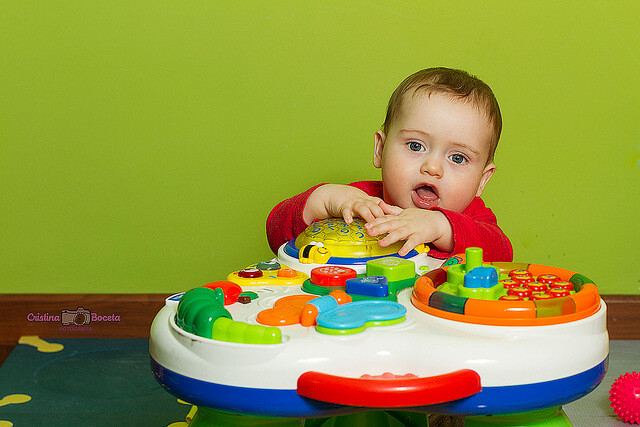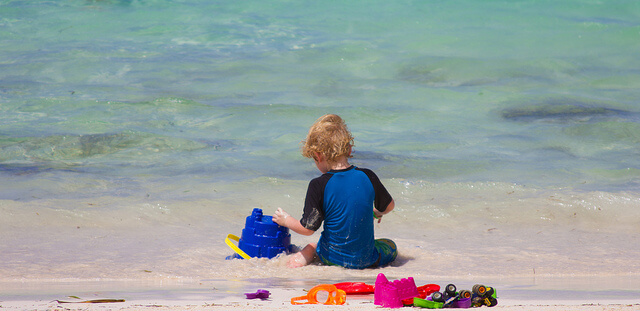Let's Play! Weekly Activities For Your Baby's First Year of Life

In your baby’s first year of life, games and mimes are fundamental for healthy development. In this article we’ll share a series of games that you can play depending on the stage of growth that your child is in.
These games can help in strengthening affective ties. They are also useful for simulating their senses and the psychomotor centers of the brain. Most importantly they help create an environment in which the child can feel safe and loved.
It is through games that children first start to learn about the world. So without further ado…
Let’s play! Weekly activities for your baby’s first year of life:
Activities from 0 to 3 months
During these months, babies practically don’t do anything other than eat and sleep. Stimulation therefore, has to be performed when the little boy or girl is awake and waiting for their food.
You can stimulate their senses by cooing with lullabies, calling the baby by their name, taking their hand and letting them take you by the finger in order to identify you.
After a bath, you can give the baby a little massage with creams. You can massage their stomach and extremities, this can help with their digestion and relax their arms and legs.
Take their legs and move them gently as if they were the pedals of a bicycle in order to strengthen their muscles. Kissing their feet is also pleasurable for them.
Pediatricians recommend taking them on walks in the morning in order for sun rays to stimulate the production of Vitamin D in their bodies. During these walks, keep a toy that makes sounds nearby.
Dancing and singing when you hold the baby in your arms can also be a lot of fun for them. This can also help them identify your voice and gestures. Always talk to them with joy in your voice.
Establish safety and relaxation rituals with the baby before bath time and bed time. This will make those tasks easier for both of you.
For example, before giving them a bath, you can leave them in their cradle for a few minutes in their diapers or naked. They will come to understand that it will soon be bath time.
In the same way, before sleeping, you can make the room a bit darker, turn off electronic devices and create a quiet environment. The child will soon get used to these habits.
Activities from 3 to 6 months

During this age, the baby has already identified their environment. They are also much more active. Make bath time a game.
Let them have fun by tapping their feet in the water. You can also give them a rubber duck to play with.
Diaper changes can also be a time of stimulation and play. Tickle the child’s belly, let them play with toys and sing to them.
At this age, babies want to grab everything and bring things to their mouths. Be careful, don’t allow them to play with toys that have small pieces. Stuffed animals that make sounds and play balls are safe and fun options.
Let the baby stand on your legs or something soft while you hold them and sing to them. Babies love being sung to.
This is a good age to start reading children’s books to them. Books with repetitions and onomatopoeias are recommended.
Activities for 6 to 9 months
At this age the child has enough strength in their extremities to crawl. Play with them with a ball, or by throwing toys.
Let them make sounds using a xylophone, piano or any other toys that make sounds when played with.
Introduce geometrical figures into games. They will start to make babbles or sounds to try to identify objects.
Activities from 9 to 12 months

Curiosity prevails during this phase. Without even mastering crawling, the child wants to start running. They look for ways to stand up by leaning on small objects or the wall.
You should supervise them at all times during this phase. It is important to create a safe environment by placing protectors on electrical sockets.
It is also recommended to have a foam mat where the child can play and explore without danger.
Continue to explore their musical repertoire and reading skills. Call the child by their name and express facial emotions. At this age, they will be able to play horse. You can also provide pets for them to play with.
All cited sources were thoroughly reviewed by our team to ensure their quality, reliability, currency, and validity. The bibliography of this article was considered reliable and of academic or scientific accuracy.
- Liliana, S. (2012). Estimulación temprana. Guía de actividades para niños de hasta 2 años. Ediciones Lea.
- Carabaño, T. (2019b, mayo 9). Estimulación en los bebés: aprender a activar los sentidos. Recuperado abril de 2020, de https://mejorconsalud.as.com/estimulacion-en-los-bebes-aprender-a-activar-los-sentidos/
This text is provided for informational purposes only and does not replace consultation with a professional. If in doubt, consult your specialist.








